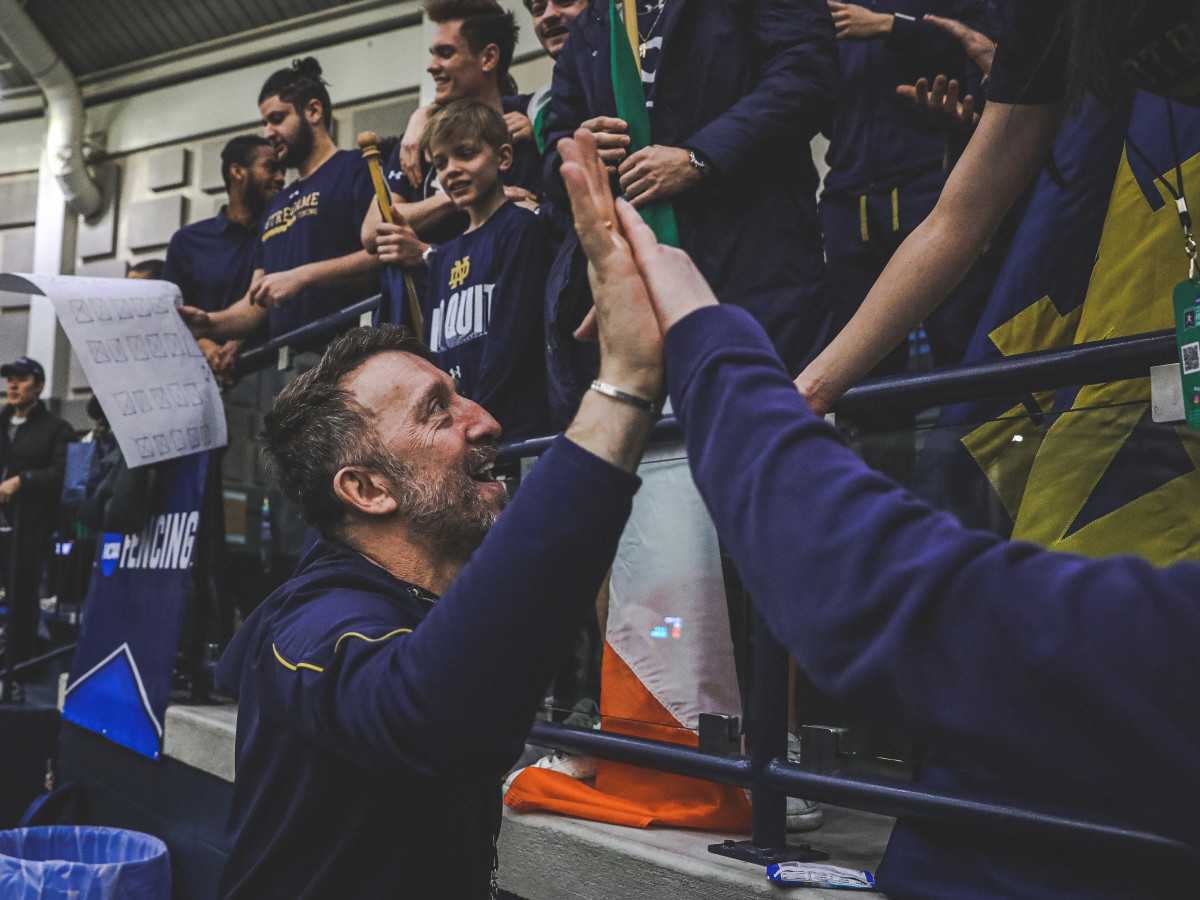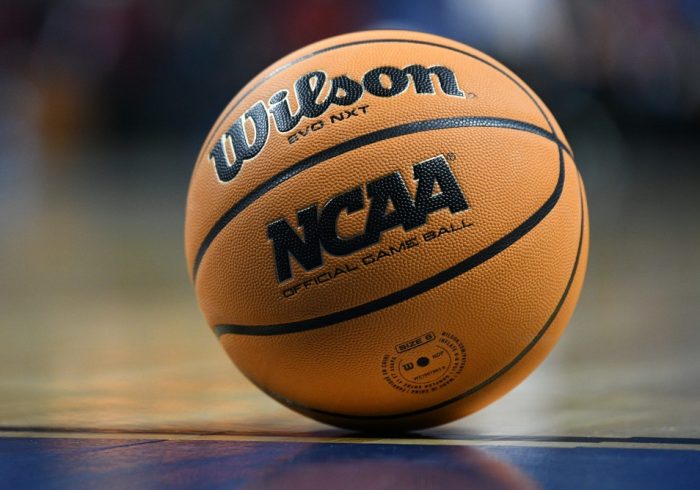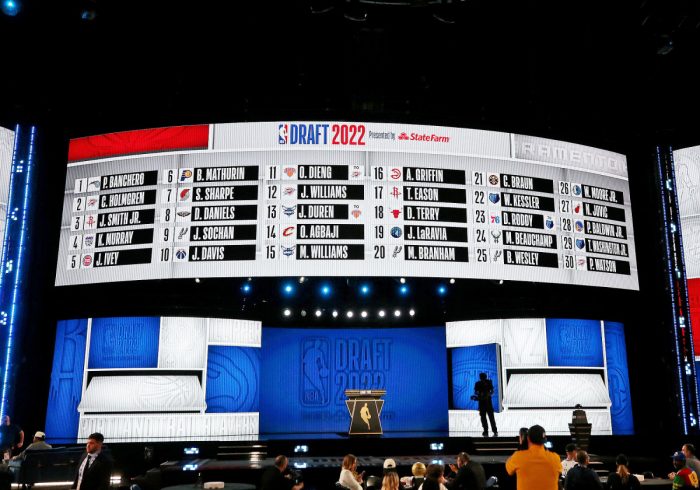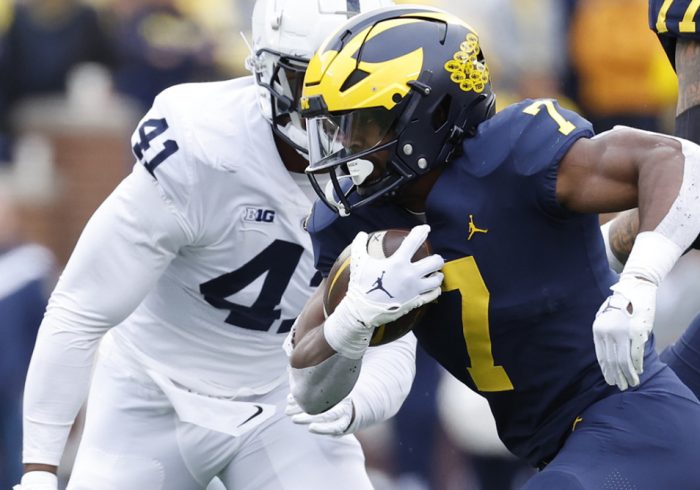As they run out of the locker room before every home game, Notre Dame football players touch the iconic sign above their locker room doors: “Play like a champion today.” Over the sign hangs a list of the team’s NCAA record 11 national championships. But as of last year, there is one team at Notre Dame with even more success. And it hangs a different slogan on its locker room exit: “Excellence is a habit.”
With its second consecutive NCAA title last year, Notre Dame fencing secured its 12th national championship, becoming the most decorated program in school history. Coach Gia Kvaratskhelia has led the Fighting Irish to four national championships in the past five years, a feat not even Knute Rockne or Frank Leahy could accomplish. Since 2015, Kvarastkhelia has nine ACC Coach of the Year awards, more than double any other coach in the conference. This season he will have the chance to make history again: With a national title, the Irish would be the first team in school history to win three straight championships.
A second slogan hangs on the walls of the fencing gym, and it’s just as important as the first: “One team, one heartbeat.”
Kvaratskhelia has led the Fighting Irish to four national championships in the past five years, a feat not even legends Rockne or Leahy could accomplish.
Courtesy of The University of Notre Dame
“We cannot win without each other. And we cannot succeed without each other,” says Kvaratskhelia. “When you decide to come to the Notre Dame team, no matter how great you are, no matter who you are, you have to be a part of this culture and dynamic.”
In a sport that’s highly individualized, working as a team is easier said than done. NCAA fencing is unique in that men and women compete separately, but team championships are dependent on the performances of both squads. Teams are also split up into three different weapons: foil, saber, and épée. And if that’s not enough to divide a team, Notre Dame has fencers hailing from 15 countries on five continents.
“Women and men, the different weapons, different backgrounds, different ideologies, different religions, different races. Can we do that?” asks Kvarastkhelia. “We want to show them that there is something bigger than individuals. Team cohesiveness, team success, is absolutely the biggest focus for us.”
Athletes and coaches alike praise Kvaratskhelia’s communication skills and ability to bring the team together. Perhaps the most effective, if unconventional, way he builds team unity is an annual team training with Navy SEALs.
“We wake up at 4:30 in the morning, swimming,” says senior Marcello Olivares, the 2021 NCAA champion in men’s foil. “Our bodies are getting broken down. But we’re all there together. As a team, we’re picking up each other, cheering each other.”
Hours of crawling in mud and training in freezing rain might sound like an extreme team-building tactic, but when you have to bring together more than 60 athletes with countless different backgrounds and identities, it’s tough to argue with Kvaratskhelia’s tactics. (It has shades of coach Herman Boone in Remember the Titans forcing his players to run through miles of swamp at 3 in the morning. If it works, it works.)
While the Irish have had their share of team success (they have more team titles than any other school this century), their individual success is also unmatched. During Kvaratskhelia’s eight-year tenure, Notre Dame has boasted 18 individual NCAA champions.
At the Tokyo Olympics, eight of the 24 fencers on USA’s roster competed for Notre Dame. Five Americans reached the podium—three are Notre Dame alums. The second U.S. fencer ever to win gold, foilist Lee Kiefer, was one of them. The first to win gold, back in 2004: another Notre Dame graduate, saberist Mariel Zagunis.
Notre Dame fencing has a long history of dominance. In 1972, shortly after Title IX was passed, coach Mike DeCicco was one of the first coaches on campus to integrate his team, immediately incorporating a women’s squad that practiced and competed alongside the men. Decicco led the team to five national titles during his 34-year reign and established the Irish as a perennial powerhouse. He was so successful that in 1980 Sports Illustrated ran a full-length feature story on him, calling him “the most successful coach in Notre Dame history.” With a championship this year, Kvarastkhelia might claim that title for himself.
Today, Notre Dame has the best facilities in the country and, as Kvarastkehlia proudly notes, is the only team with a full-time armorer, who maintains and repairs all of the equipment. The program also employs a psychologist, nutritionist and a team academic adviser. If that’s not enough to attract fencers, it also offers the maximum number of fencing scholarships allowed by the NCAA, with 9.5 athletic scholarships awarded along with academic scholarships and need-based aid.
For Kvaratskhelia, though, what truly sets Notre Dame apart is its commitment to its athletes both in and out of the gym.
“Our coaches are truly fully invested in developing our athletes as people,” says Kvarastkhelia. “That is the most important. That’s why kids are so committed to us, because they know that we are 100% committed to their development as humans.”
Kvaratskhelia immigrated from the former Soviet Republic of Georgia in 1994 and quickly discovered a love for coaching. He coached for 13 years at the Kanza Fencing Club in Salina, Kans., growing the small club into a nationally respected foil center. He was hired as an assistant coach at Notre Dame in 2006 and established himself as one of the best foil coaches in the country. At Kanza, Kvaratskhelia’s goal was to prepare his fencers to compete in college. Now, his goal is to prepare his fencers for adult life.
The coed nature of the sport can be especially challenging to navigate, but half a century after DeCicco first integrated the team, it seems Kvaratskhelia has no problem getting men and women to work together. In a time rife with outcry over discrepancies between men’s and women’s sports and controversy over who’s allowed to play what, the Irish are setting an example of what success can look like in a coed environment.
“It’s one nucleus,” says Kvaratskhelia. “We recruit the team together. They train together. They condition together. They spar together. It’s all mixed.”
The athletes seem to agree.
“It’s like having a bunch of big brothers on the team,” says Amita Berthier, a senior foilist and two-time All-American. “We’re very fortunate to have such a huge team with so many different personalities.”
Berthier hails from Singapore and in 2021 became the first fencer from the republic to qualify for the Olympics. Growing up, she undertook Project Read, helping to build reading habits in students from low-income backgrounds. She also volunteered as a photographer documenting conserved areas in Singapore.
When choosing where to attend college, Berthier was torn between Notre Dame and Columbia, another fencing powerhouse—the former has won four of the last seven national titles, with the latter winning the other three. After visiting South Bend, though, Berthier’s mind was made up.
In the middle of Berthier’s sophomore year at Notre Dame, COVID-19 hit. While she was quarantining back home, a young fan from the Philippines reached out and told her that her fencing club was shut down because of the pandemic. Berthier offered to teach the girl and her fellow fencers virtually and ended up coaching 17 young fencers every week, free of charge.
“Gia is very particular about having respect for each other and anybody that you fence, even if it’s not your teammate,” says Berthier (left).
Courtesy of The University of Notre Dame
“Fencing is such a niche, expensive sport, but you shouldn’t be taking away the opportunity to become a super successful athlete just because you don’t have the resources for it,” says Berthier. “My biggest motivation is probably to help the least privileged kids. Whenever I can give back, I like to give back.”
This character and commitment to others, according to Kvaratskhelia, is the most important attribute of a Notre Dame fencer.
“We recruit based on the character,” says Kvaratskhelia. “They self-vet themselves. They see what the expectations are, what the team direction is and the team dynamics are. And they make a decision to come here.”
The coaching staff generally recruits at national meets and tournaments—Kvaratskhelia says 60–70% of Irish fencers compete on a national level. For recruits, the support from the coaches and Notre Dame fencers at these meets can make all the difference.
“They would be by my strip literally cheering like I was part of the team,” Olivares says. “I felt so welcomed, it was almost like I was already on the team.”
Accountability is also a primary focus for the Irish, and on a team that’s double the size of most other fencing squads, the athletes have to take some individual accountability. Notre Dame has no captains—for Kvaratskhelia, everyone should have that responsibility.
“There’s very good sportsmanship on our team. If there wasn’t, it wouldn’t be tolerated by the coaches, so nobody dares act out of order,” says Berthier. “Gia is very particular about having respect for each other and anybody that you fence, even if it’s not your teammate.”
Despite the hyperfocus on team unity, the program does a lot to promote individual success. World Cups and Olympic qualifiers occasionally conflict with NCAA meets, and generally speaking Kvaratskhelia encourages his fencers to miss team meets to compete in national events. This is where having a deep bench comes in handy—with over 60 fencers, the Irish still win meets even without their top athletes.
In the spring of 2021, an Olympic qualifying event happened to fall on the same day as the NCAA championships. Nick Itkin, then a junior foilist for the Irish, was vying for a spot on Team USA. Despite the importance of the NCAAs, the coaching staff pushed Itkin to attend the qualifiers. Sure enough, Itkin won the event and earned a spot on the team. In his absence, Notre Dame won the national championship anyway.
This year, the championships won’t coincide with any qualifiers or World Cups. As the 2023 season gets under way, the defending champs have one goal in mind: winning that elusive third consecutive title.
“We’re not here to lose. We’re here to continue this legacy,” says Kvaratskhelia. “We’re not a dynasty—yet.”



